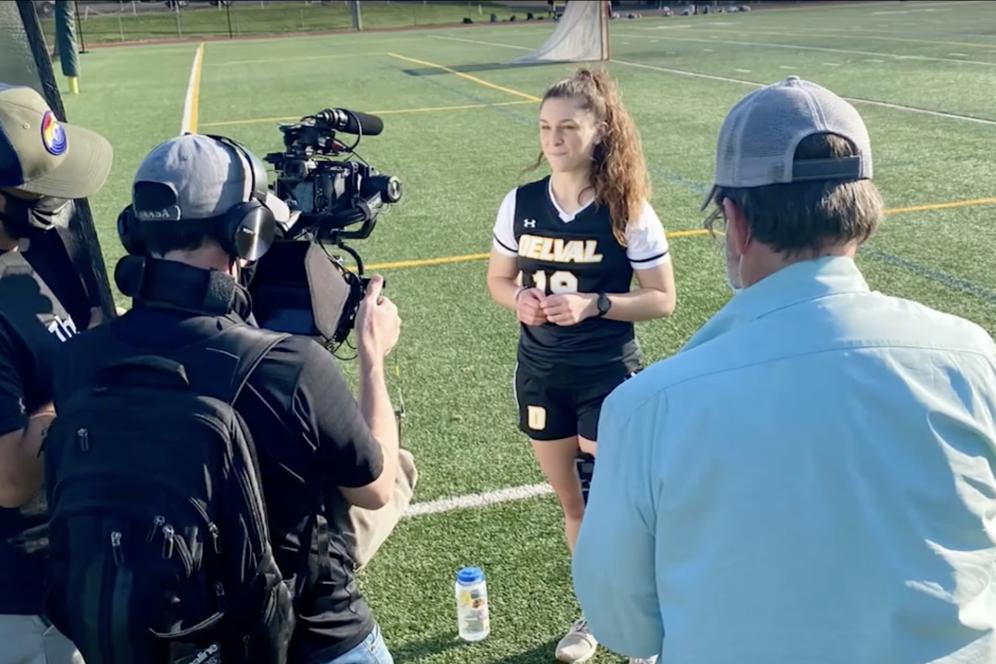Dr. Karen Schramm
Be a DelVal Storyteller: Dr. Karen Schramm Shares Her Story
“What do you want to be when you grow up?” she asked. Unlike those five-year-olds who proudly announce, “marine biologist,” or four-year-olds who, eyes aglow, manage to wrap their tiny mouths around “veterinarian,” I had no clue.
I knew I loved nature—forests, mountains, and waterways all called to my hungering soul—and being in it: camping, hiking, boating, simply relishing the bewitching song of the red-winged blackbird as I paused rowing on the misty lake in the cool, early morn. I knew I’d spend time on the Appalachian Trail, knew I’d check out the high desert, knew I’d travel to the wind-swept prairies—the prairies thanks to Laura Ingalls Wilder’s Little House narratives—because nature was precious to me and everything enthralled me.
At age eight, at Rocks State Park in Maryland, I witnessed the emergence of the cicadas in all their red-eyed, golden-winged splendor. So profound an impression they made that I vowed to return every seventeen years to see them. And I have, including on June 1, 2021, as Brood X greeted the world with their resounding calls.
I also knew I loved to read and write. Indeed, at seven years old, I had read the dictionary, cover to cover. Yep, I was an unusual child. I loved words, their wondrous sounds and shapes and meanings, words like jonquil, amethyst, shimmering, Tintagel Castle; how some words could hold such opposite meanings, such as host, cleave, sanction; how they mischievously did not always follow the rules: “Vowels take ‘an’ instead of ‘a,’ before them,” my third-grade teacher announced. My hand shot up.
“What about uniform?” I demanded eagerly. Her eyes widened, then she smiled. “Good point, Karen. Sometimes there are exceptions.” In sixth grade, I had a teacher who recognized my love of languages and let me borrow her German dictionary. I promptly began writing poems to her—in German. Did I mention, I was an unusual child?
But it was one thing knowing what appealed to me, quite another knowing what career would suit my inquisitive mind. I knew my job would somehow involve the environment. I was equally sure it would involve words. But how?
When I applied to Rutgers University’s graduate program, I was offered a Teaching Assistantship: They’d pay for my education and give me a stipend. “Do you want it?”
I was all of 21. I had never had a job (unless you count babysitting) because I didn’t need one. Having never been obsessed with fashion, accessories, or makeup, I did not need an income, and besides, in college I had received merit scholarships. I had taken whatever courses tickled my fancy: lots of history and language courses, just for fun. I took French and Russian at the same time: that was cool. College was what it is supposed to be: a delightful odyssey of the mind, an exhilarating adventure into academia.
“Yes,” I replied confidently. “I’ll do it.” I have been teaching ever since, and it is the greatest job in the world.
Education and Scholarly Interests
Karen Schramm received her B.A. and M.A. from Rutgers University and her Ph.D. from the University of Delaware. Her dissertation examines the role of the wilderness in American life and literature. Prior to Del Val, she taught at Rutgers, the University of Delaware, Rowan University, and two community colleges. When she came across an ad for a teaching position at a small, private institution, Delaware Valley College, she was strongly attracted to its focus on teaching. She applied and the rest is, well, ongoing history.
Through the years, Dr. Schramm has taught 23 different courses, ranging from Basic Writing Skills to the Modern Short Story. Her two favorites are Environmental Literature and Introduction to Literature: Creature Comforts, which she designed to focus on animals in fiction and creative non-fiction. A Partner in Conservation with the World Wildlife Fund, Dr. Schramm supports initiatives to protect wilderness areas ranging from the Amazon to the American Prairie. A frequent presenter at scholarly conventions, she also has 30+ publications to her credit, including with Oxford and Cambridge University Presses.
UNDERGRADUATE DEPARTMENT
- English
EDUCATION
- Ph.D., English (American Literature), University of Delaware. Dissertation: “The Inspirational Wilderness: The Role of the Wilderness in the Literature of the American Renaissance.”
- M.A., English, Rutgers University
- B.A., English, Rutgers University
PUBLICATIONS
- “The Literary Culture of Jamestown,” a chapter in the volume, The History of Virginia Literature. New York: Cambridge University Press, 2015. My chapter is considered definitive on the topic.
- “SummerTreasure,” a haiku poem, published in July 2012, in the National Gallery of Writing, a scholarly online community site sponsored by the National Council of Teachers of English.
- “SpringGift,” a haiku poem, published in October 2011, in the National Gallery of Writing, a scholarly online community site sponsored by the National Council of Teachers of English.
- “What Are You Doing…about Technology in the Classroom?: Or, Stop Short-Circuiting Learning From Day One,” English Leadership Quarterly 34.1 (August 2011).
- The Gleaner (as Advisor, Copy-Editor, and Occasional Contributor), 2012-2013; 2011-2012; 2010-2011; 2009-2010; 2008-2009; 2007-2008; 2006-2007; 2005-2006; 2004-2005; 2003-2004; 2002-2003; 2001-2002; 2000-2001; 1999-2000; 1998-1999. Tiger Printing Co., for DVC.
- “AutumnBlessings,” a haiku poem, published in October 2010, in the National Gallery of Writing, a scholarly online community site sponsored by the National Council of Teachers of English and also published in the DelVal Digest, December 2010.
- “WinterGlory,” a haiku poem, published in January 2010, in the National Gallery of Writing, a scholarly online community site sponsored by the National Council of Teachers of English.
- “Promotional Literature,” a chapter in the volume, The Oxford Handbook of Early American Literature. New York: Oxford University Press, 2008. My chapter is considered definitive on the topic.
- Del Val Periodic Review Interim Report, co-edited with Dr. Robert Yapsuga and presented to Middle States Commission on May 21, 2008.
- “Tecknowledgey Teens: Or, Just Try Thinking Away from the Box,” English Leadership Quarterly 29.4 (April 2007).
- “’Seeing Like a Pinecone’: The ‘Angered Porcupine’ Approach to Creative Teaching.” English Leadership Quarterly 27.3 (February 2005).
- “The ‘Devil’s Territories’ or ‘The Preservation of the World’?: Thoreau’s Subversion of Puritan Wilderness Discourse,” in Finding Colonial America(s). Newark: University of Delaware Press, 2001.
- “Hands-On Thinking and Learning: A Hands-Down Favorite.” English Leadership Quarterly 24.1 (August 2001).
- “My Office is Open—Get Your Tickets Now!” Teaching for Success 12.8 (November 2000).
- “A Bird’s-Eye View: Clarifying and Enriching Essays,” Teaching for Success 11.7 (October 1999).
- “Winning the War of Words: Improving Our Students’ Spelling,” English Leadership Quarterly Volume 21, Number 4 (April 1999).
- Six 6-page articles for American National Biography: John Lauris Blake; Charles James Cannon; William Alexander Carruthers; George Coggeshall; Thomas Jefferson Farnham; Samuel Griswold Goodrich. The American Council of Learned Societies. New York: Oxford University Press, 1999.
- “Blow Away Boredom!: Hats Off to…Hats!” Teaching for Success 10.8 (November 1998).
- “Making the Grade,” Teaching for Success 9.5 (August 1997); winner of $300 award for best article.
- “Team Questions Motivate Students,” Teaching for Success 9.2 (February 1997).
- “Nathaniel Parker Willis,” in DLB’s American Travel Writers, 1776-1864, 2 volumes. Detroit: Gale Research, 1997.
- “Attendance a Problem? Try This Contract Approach,” Teaching for Success 8.5 (August 1996).
- "Why Do Your Students Feel Like Bowling Balls?" Teaching for Success, Vol. 8, No. 3 (March 1996).
- "The Advice Column: Friends Helping Friends." Teaching for Success, Vol. 7, No. 6 (September 15, 1995).
- 'In His Sight': Biblical Allusion as Rhetorical Strategy in Lowell's The Biglow Papers." Massachusetts Studies in English, Winter 1992: 1-20.


